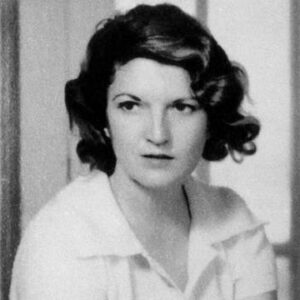Zelda Fitzgerald was the wife of American novelist Scott Fitzgerald, and the couple was widely regarded as one of the era’s most celebrated figures. She was glamorous, ambitious, and fun-loving, and she was determined not to remain in her husband’s shadow, first as a writer, and later as a dancer. Scott, her husband, was probably threatened by this and attempted to pull her down constantly. She took her fearlessness and headstrong attitude too far, and some even labeled her as insane. While her husband was alive, he went unrecognized for his writings, and he became bitter. He would snoop through her diary entries for material for his novels, which she despised. He thwarted her attempts at writing, and as a result, she took up ballet dancing and painting. She, like her husband, was diagnosed as schizophrenic only after death. Later works and investigations into her were sympathetic to her, claiming that Scott was a tyrant and domineering husband. Even today, she continues to fascinate and inspire feminists. Her struggle to break free from her husband’s control and chart her own course as an artist and a woman earned her a place among the 1920s’ most prominent female figures.
Childhood & Adolescence
Zelda Fitzgerald was born in Montgomery, Alabama, the youngest of six children of Minerva Buckner and Anthony Dickinson Sayre, an Alabama Supreme Court justice.
She was a very active child who took ballet lessons and enjoyed being outside. She was an intelligent student who was not overly academic. In 1914, she enrolled at Sidney Lanier High School.
She graduated from Sidney Lanier High School as the class’s Most Beautiful and Attractive girl. In 1918, at a Montgomery Country Club dance, she met her future husband Scott Fitzgerald.
Career of Zelda
When she was asked to write a review of ‘The Beautiful and Damned’ for the New York Tribune in 1922, she revealed in her characteristically cheeky fashion that Scott plagiarized material from her diaries. She received offers to write for magazines as a result of this well-written review.
In June 1922, she penned an essay for the ‘Metropolitan’ Magazine titled ‘Eulogy On The Flapper’. She lamented the decline of the flapper lifestyle and defended her own unconventional and audacious existence in this essay.
She continued to write short stories and articles and collaborated with her husband on the 1923 play ‘The Vegetable.’
The play failed, and as a result of their extravagant lifestyle, they became in debt. They relocated to Antibes on the French Riviera, where she fell in love with Edouard Jozan, a French aviator. Although the affair ended, her relationship with her husband became irreparably damaged.
Her short essay, ‘Does Every Married Man Experience A Moment Of Revolt?’ appeared in the magazine ‘McCall’s’ in 1924, and she began painting as a hobby.
Scott met Ernest Hemingway in 1925 and became fast friends with him, which she disapproved of. She went so far as to accuse her husband of having an affair with Hemingway.
She declined an invitation in 1929 to join the ballet school of the San Carlo Opera Ballet Company in Naples. Scott regarded her obsession with ballet as pointless.
She was diagnosed as schizophrenic in 1930 and admitted to a French sanatorium. After her father’s death and Scott’s departure for Hollywood, she returned to the sanatorium.
Her 1934 exhibition of paintings depicting patients in and out of sanatoriums met with lukewarm reception. Her husband, now bitter over successive failures, had developed a drinking problem and was having an affair with a film critic.
Scott died in 1940 while working on his final novel, ‘The Love of the Last Tycoon’. She persuaded literary critic Edmund Wilson to edit the work.
Following Scott’s death, she began writing a novel titled ‘Caesar’s Things,’ which she never finished.
Significant Works of Zelda
Zelda Fitzgerald’s sole novel, ‘Save Me the Waltz,’ is a semi-autobiographical account of her life and marriage to Scott Fitzgerald. It was not well received upon publication in 1932, selling only 1392 copies.
‘The Collected Writings,’ a comprehensive collection of her works published in 1991, solidifies her position as a writer by including her farce, short stories, articles, and letters.
Personal History and Legacies
In 1920, she married Scott at New York’s St Patrick’s Cathedral, and the couple quickly gained notoriety for their wild behavior.
Zelda Fitzgerald gave birth to Frances “Scottie” Fitzgerald in 1921. She was apparently uninterested in domesticity or housekeeping when she became pregnant again in 1922. This incident was incorporated into Scott’s novel ‘The Beautiful and Damned.’
Zelda died in a fire at Highland Hospital in 1948 and was initially buried alongside Scott in Rockville, Maryland. Scottie, her lone child, survived her.
Nancy Milford, a Columbia University graduate student, published ‘Zelda: A Biography’ in 1970. The book depicted her as a self-sufficient artist whose abilities were diminished by a controlling husband.
Don Henley and Bernie Leadon’s 1972 Eagles song ‘Witchy Woman’ was inspired by her and refers to her wild destructive partying and time in a mental institution.
In 1989, the ‘F. Scott and Zelda Fitzgerald Museum’ opened in Montgomery, Alabama, in a house they briefly rented, displaying some of Zelda’s paintings.
Estimated Ner Worth
The net worth of Zelda is $20million.
Trivia
‘I’m not interested in living. I want to love first and live incidentally’—these were the words of this pioneering feminist American writer.
This famous personality was dubbed ‘the first American Flapper’ by her novelist husband due to her carefree attitude and lifestyle.


